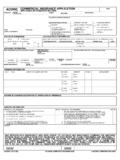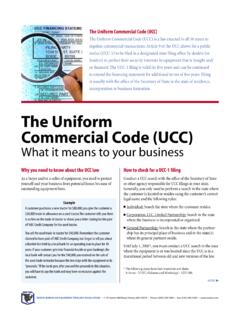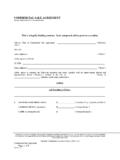Transcription of Admiralty and Maritime Law - Public.Resource.Org
1 Admiralty and Maritime LawRobert ForceNiels F. Johnsen Professor of Maritime LawCo-Director, Tulane Maritime Law CenterTulane Law SchoolFederal Judicial Center 2004 This Federal Judicial Center publication was undertaken in furtherance of theCenter s statutory mission to develop and conduct education programs forjudicial branch employees. The views expressed are those of the author andnot necessarily those of the Federal Judicial ixChapter 1: Jurisdiction and Procedure in Admiralty and MaritimeCases 1 Introduction 1 Admiralty Jurisdiction in Tort Cases 3 Navigable Waters of the United States 3 The Admiralty Locus and Nexus Requirements 5 Maritime Locus 5 The Admiralty Extension Act 6 Maritime Nexus 6 Admiralty Jurisdiction in Contract Cases 9 Mixed Contracts 11 Multiple Jurisdictional Bases 12 Rule 9(h) of the Federal Rules of Civil Procedure 12 Multiple Claims 12 The Saving to Suitors Clause 18 Admiralty Cases in State Courts 18 Admiralty Actions At Law in Federal Courts 18 Law Applicable 19 Removal 19 Sources of Admiralty and Maritime Law 20 The General Maritime Law 21 Choice of Law: or Foreign 21 Procedure in Admiralty Cases 27 Special Admiralty Rules 28 Types of Actions.
2 In Personam, In Rem, Quasi In Rem 28 The Complaint 34 Security for Costs 34 Property Not Within the District 34 Necessity for Seizure and Retention Exceptions 35 Post-Arrest/Post-Attachment Hearing 36 Release of Property Security 36 Increase or Decrease of Security; Counter-Security 38 Restricted Appearance 38 Sale of Property 39 Admiralty and Maritime LawivChapter 2: commercial Law 41 Introduction 41 Charter Parties 42 Definition and Types 42 The Contract 44 Typical Areas of Dispute 44 Withdrawal 50 Subcharters 50 Liability of the Owner for Damage or Loss of Goods 51 Arbitration Clauses 51 Transport Under Bills of Lading 52 Introduction 52 Legislation 54 Bills of Lading Under the Pomerene Act 54 Applicability 54 Negotiable and Nonnegotiable Bills of Lading 54 Carrier Obligation and Liability 55 The Harter Act 56 Applicability and Duration 56 Prohibition of Exculpatory Clauses Under the Harter Act 56 Carrier s Defenses Under the Harter Act 57 Unseaworthiness 58 Carriage of Goods by Sea Act 58 Scope and Application 58 Parties to the Contract of Carriage.
3 The COGSA Carrier 61 Duration 63 Carrier s Duty to Issue Bills of Lading 63 Carrier s Duties Relating to Vessel and Cargo 64 Exculpatory Clauses Prohibited 64 Immunities of Carrier 65 Deviation 73 Damages and Limitation of Carrier s Liability 74 Burden of Proof 78 Notice of Loss or Damage 79 Time Bar 80 Extending the Application of COGSA 80 Jurisdiction and Choice-of-Law Clauses 82 ContentsvChapter 3: Personal Injury and Death 83 Introduction 83 Damages 84 Statute of Limitations 85 Federal and State Courts 85 Removal 85In Personam and In Rem Actions 86 Seamen s Remedies 86 Introduction 86 Maintenance and Cure 87 Negligence: The Jones Act 91 Unseaworthiness 99 Contributory Negligence and Assumption of Risk in Jones Act andUnseaworthiness Actions 101 Maritime Workers Remedies 102 Longshore and Harbor Workers Compensation Act 102 Scope of Coverage 102 Remedies Under the LHWCA 106 Dual-Capacity Employers 110 Indemnity and Employer Liens 111 Forum and Time for Suit 111 Offshore Workers Remedies 112 The Outer Continental Shelf Lands Act 112 Remedies of Nonmaritime Persons 114 Passengers and Others Lawfully Aboard a Ship 114 Recreational Boating and Personal Watercraft 116 Maritime Products Liability 117 Remedies for Wrongful Death 117 Introduction 117 Death on the High Seas Act 118 Wrongful Death Under the General Maritime Law 120 Chapter 4: Collision and Other Accidents 125 Introduction 125 Liability 126 Causation 126 Presumptions 127 Damages 128 Pilots 131 Place of Suit and Choice of Law 132 Admiralty and Maritime LawviChapter 5.
4 Limitation of Liability 133 Introduction 133 Practice and Procedure 133 The Limitation Fund 136 Parties and Vessels Entitled to Limit 138 Grounds for Denying Limitation: Privity or Knowledge 139 Claims Subject to Limitation 140 Choice of Law 141 Chapter 6: Towage 143 Towage Contracts 143 Duties of Tug 144 Duties of Tow 145 Liability of the Tug and the Tow to Third Parties 146 Exculpatory and Benefit-of-Insurance Clauses 146 Chapter 7: Pilotage 149 Introduction 149 Regulation of Pilots 150 Liability of Pilots and Pilot Associations 151 Exculpatory Pilotage Clauses 152 Chapter 8: Salvage 153 Introduction 153 Elements of Pure Salvage Claims 154 Salvage and Finds Distinguished 156 Salvage Awards 157 Misconduct of Salvors 159 Contract Salvage 160 Life Salvage 161 Chapter 9: Maritime Liens and Mortgages 163 Liens 163 Property to Which Maritime Liens Attach 164 Custodia Legis 165 Categories of Maritime Liens 165 Contract Liens 166 Preferred Ship Mortgage 168 Liens for Necessaries 168 ContentsviiPersons Who May Acquire Maritime Liens 171 Priorities of Liens 171 Ranking of Liens 171 Governmental Claims 174 Conflicts of Laws 174 Extinction of Maritime Liens 175 Destruction or Release of the Res 175 Sale of the Res 175 Laches 176 Waiver 177 Bankruptcy 177 Ship Mortgages 177 Chapter 10: Marine Insurance 181 Introduction: Federal or State Law 181 Interpretation of Insurance Contracts 183 Limitation of Liability 183 Burden of Proof 183 Insurable Interest 184 Types of Insurance 184 The Hull Policy 185 Protection and Indemnity Insurance 187 Pollution Insurance 187 Cargo Insurance 188 Subrogation 188 Chapter 11.
5 Governmental Liability and Immunity 189 The Federal Government 189 The Suits in Admiralty Act 189 The Public Vessels Act 190 The Federal Tort Claims Act 190 State and Municipal Governments 191 Foreign Governments: The Foreign Sovereign Immunities Act 192 Chapter 12: General Average 195 Introduction 195 The General Average Loss: Requirements 195 The York Antwerp Rules 196 General Average, Fault, and the New Jason Clause 197 The General Average Statement 197 Admiralty and Maritime LawviiiSelected Bibliography 199 Cases 203 Statutes 227 Rules 235 Index 237ixPrefaceAs this monograph demonstrates, Admiralty and Maritime law cov-ers a broad range of subjects. This field of law has its own rules relat-ing to jurisdiction and procedure. Classically, Maritime law was a spe-cies of commercial law, and in many countries it is still treated assuch. Thus, this monograph includes topics such as charter parties,carriage of goods, and marine insurance.
6 There are also areas of mari-time law that are peculiar to the subject matter. The law of collision,towage, pilotage, salvage, limitation of liability, Maritime liens, andgeneral average are unique to Maritime law. In addition, the UnitedStates has developed its own law of Maritime personal injury anddeath. All references are to courts unless noted would like to thank Judge Eldon Fallon ( District Court forthe Eastern District of Louisiana), Judge Sarah S. Vance ( DistrictCourt for the Eastern District of Louisiana and member of the Boardof the Federal Judicial Center), and Judge W. Eugene Davis ( of Appeals for the Fifth Circuit) for their invaluable assistancein reviewing the draft of this 1 Jurisdiction and Procedure inAdmiralty and Maritime CasesIntroductionArticle III of the Constitution defines the boundaries of subject-matter jurisdiction for the courts. Specifically, it extends the judicialpower of the United States to all Cases of Admiralty and maritimeJurisdiction.
7 This grant of judicial power has been implemented byCongress in 28 1333, which states that The [United States]district courts shall have original jurisdiction, exclusive of the Courtsof the States, of (1) any civil case of Admiralty or Maritime jurisdic-tion .. In current usage the terms Admiralty jurisdiction and Maritime jurisdiction are used interchangeably. The Constitutiondoes not enumerate the types of matters or cases that fall withinthe terms Admiralty and Maritime jurisdiction. The Admiralty Clause in Article III does not disclose or even pro-vide the means for ascertaining whether a particular dispute is an ad-miralty or Maritime case. This task has been performed primarily bythe courts and, to a lesser extent, by Congress. Also, the Constitutiondoes not specify the legal rules to apply in resolving Admiralty andmaritime disputes. It does not even point to the sources of substantivelaw that judges should consult to derive such rules.
8 This task also hasbeen performed primarily by the courts and, to some extent, by Con-gress. In this regard, federal courts have not merely created rules to fillgaps or to supplement legislation as they have in other areas; theyhave played the leading role in creating a body of substantive rulesreferred to as the general Maritime law. 1 Thus, as will be discussedlater, the power of federal courts to entertain cases that fall withinadmiralty and Maritime jurisdiction has required courts, in the Force, An Essay on Federal Common Law and Admiralty , 43 St. LouisU. 1367 (1999). Admiralty and Maritime Law2cise of their jurisdiction, to formulate and apply substantive rules toresolve Admiralty and Maritime federal statute provides general rules for determining admi-ralty jurisdiction. No statute comprehensively enumerates the variouscategories of cases that fall within Admiralty jurisdiction. With twoexceptions, the few instances where Congress has expressly conferredadmiralty jurisdiction on federal district courts always has been inconnection with the creation of a specific, new statutory right.
9 Nota-ble examples include the Limitation of Vessel Owner s Liability Act,2the Ship Mortgage Act,3 the Death on the High Seas Act,4 the Suits inAdmiralty Act,5 the Public Vessels Act,6 the Outer Continental ShelfLands Act,7 and the Oil Pollution Act of By contrast, the Car-riage of Goods by Sea Act9 and the Federal Maritime Lien Act10 makeno reference to Admiralty jurisdiction. The Jones Act provides an ac-tion on the law side but is silent as to whether an action can bebrought in The tort and indemnity provisions of theLongshore and Harbor Workers Compensation Act (LHWCA) like-wise make no reference to Admiralty jurisdiction. Congress has notspoken to jurisdiction over collision cases or cases involving towage,pilotage, or salvage. No statutes confer Admiralty jurisdiction overmarine insurance disputes. With the exception of the Death on theHigh Seas Act (DOHSA), the Jones Act, and the LHWCA, Congresshas not addressed the substantive law of Maritime personal injury anddeath claims, let alone the issue of jurisdiction over such app.
10 183 (2000). 31301 (2000). app. 761 (2000). 1331 (2000). 2701 (2000). app. 1301 (2000). 31341 (2000). app. 688 (2000). The Jones Act, which provides for recovery forinjury to or death of a seaman, is discussed in greater detail, infra text accompanyingnotes 411 1: Jurisdiction and Procedure in Admiralty and Maritime Cases3In addition to 28 1333, the Admiralty Extension Act12and the Great Lakes Act13 are the only instances where Congress hasenacted Admiralty jurisdiction statutes that are not tied to a specificstatutorily created right. By and large it appears that Congress hasbeen content to allow the federal courts to define the limits of theiradmiralty Jurisdiction in Tort CasesNavigable Waters of the United StatesThere has never been any doubt that Admiralty jurisdiction extends tothe high seas and the territorial The same may not be said ofinland waters. Originally courts applied the English rules for de-termining Admiralty jurisdiction.




